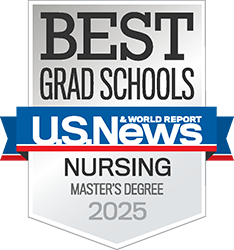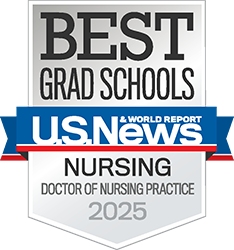Barr advances research on HIV and lactation support

After decades of being told that parents with HIV are not able to breast/chestfeed their infants, research shows that highly active antiretroviral HIV therapy reduces the chances of HIV transmission to the newborn.
To help spread the word, Cizik School of Nursing at UTHealth Houston Assistant Professor Emily Barr, PhD, CPNP-PC, CNM, ACRN, FACNM, FAAN, will use a $5,000 Dean’s Research Award to further her research on improving HIV knowledge and training for lactation consultants using telehealth to support people living with HIV in their infant feeding decisions.
Typically, parents with HIV in the United States and other higher income countries have been advised to use replacement feeding, like formula, due to the risk of transmitting the HIV virus to their babies through human milk. However, research has shown that the risk of transmission has significantly decreased, falling from 30-50% to less than 1% when HIV is fully suppressed with antiretroviral medications. This led to a significant policy change in January 2023 when the U.S. Department of Health and Human Services updated guidelines, recommending women and other parents with HIV who are virologically suppressed be offered a choice to breast/chestfeed their infants.
Despite this policy change, awareness remains limited, leading to inconsistent practices among health care providers, noted Dr. Barr, an expert in HIV care with over 30 years of experience in the field.
“Every situation is still unique, and a lot of people don’t know about the new guidelines,” she said. “You’d have a woman with HIV show up to deliver a baby on a unit, and then she wants to breastfeed, but the nurses on the unit don’t know that it’s safe. They say, ‘No, you can’t breastfeed because you have HIV.’”
Recognizing this gap, Dr. Barr surveyed 203 lactation consultants in the United States and Canada to assess their knowledge of HIV, particularly in the context of breast/chestfeeding, and their experiences with telehealth – a practice that has gained popularity since the COVID-19 pandemic.
“Lactation consultants offer critical specialized support, and including their telehealth experience was important,” she said. “Consultants could be based centrally, but provide what they call ‘tele-lactation’ to support to people with HIV who are breastfeeding, regardless of their location."
Preliminary findings from the study revealed that while lactation consultants generally have a good understanding of HIV, their knowledge of the nuances of HIV and breastfeeding is relatively low. Furthermore, the study highlighted a moderate level of HIV stigma among lactation consultants, reflecting the need for targeted education and training.
The Dean’s Research Award will support the completion of the quantitative analysis of the survey data, with plans to publish the findings.
“Our goal is training the lactation consultants to be able to increase their knowledge about how to specifically support people who are living with HIV and breastfeeding or chestfeeding,” she said. “We will also address ingrained stigma, with the ultimate goal of testing its effectiveness through a larger grant.”
Co-investigators on the study, “Tele-lactation for breast/chestfeeding parents with HIV: An examination of HIV-knowledge, attitudes, experiences, and HIV stigma in certified lactation consultants in the United States and Canada,” are Assistant Professor Rebecca Tsusaki, PhD, WHNP-BC, IBCLC MPH, of Cizik School of Nursing; UTHealth Houston School of Public Health statistician Hulin Wu, PhD; Jennifer McKinney, MD, of Baylor College of Medicine; Lisa Abuogi, MD, of University of Colorado; and Elizabeth Lowenthal, MD, of Children’s Hospital of Philadelphia.
Merve Erten



